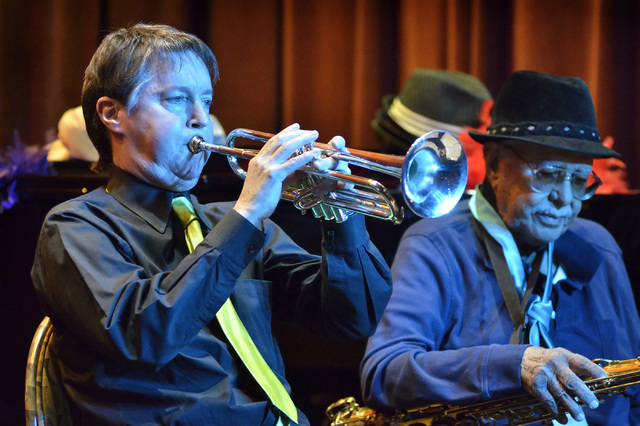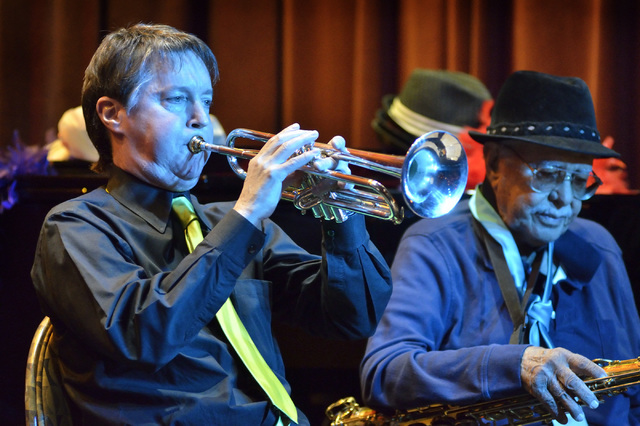Local 369 musicians union members reflect on changing sounds in Las Vegas



The Musicians Union of Las Vegas, Local 369, has played for every major headliner, lounge entertainer and production show in Las Vegas since less than three decades after city’s founding. The union celebrated that longevity and its 85th anniversary Oct. 13.
Founded in 1931 as the Musicians Protective Union, Local 369 represents arrangers, orchestrators, copyists, proofreaders, music librarians, vocalists and support crew members in Clark and Lincoln counties.
Union President Jack Gaughan (no relation to the late Jackie Gaughan, who owned three casinos downtown) came to Las Vegas in 1999. The union was at height at the time, he said, with 2,500 members. Now, it has about 600. Longtime musicians regularly talk about the city’s early days, Elvis Presley and the mob, he said.
“I like hearing all those stories,” Gaughan said. “It’s fun to learn all that history and how we got from there to here. It’s fascinating — a world that doesn’t exist any longer.”
It went extinct in 1989, he said, when casinos changed from live to recorded music, prompting an unsuccessful strike.
“It was extremely devastating,” Gaughan said. “It was a knockout punch from which the local musicians are still trying to recover.”
But “real” music can still be heard, he said, citing Wynn’s Showstoppers, Donnie & Marie at the Flamingo, Celine Dion at The Colosseum at Caesars Palace and Million Dollar Quartet at Harrah’s.
Longtime musicians spoke with View, offering a glimpse of what it was like to perform in the city’s early days.
Tommy Porrello was playing trumpet on Broadway for Barbra Streisand’s “Funny Girl” when he learned of a job opening with bandleader Harry James. That brought him in 1964 to Las Vegas, where James was under contract at the Flamingo.
“Most hotels were one story,” he said. “The Strip was nothing like it is now.”
He and his wife, Mary Lou, rented a place near Tropicana Avenue and Boulder Highway. Getting to work was easy, as there was little traffic on the narrow road. The few times when he saw an oncoming car, each driver had to “put a wheel in the dirt” to pass the other.
Porrello left James after five years to play at the Frontier and Riviera lounges. There, he said, Frank Sinatra was a regular. He also played for Tony Bennett, Liberace, Glen Campbell, Streisand or whoever else was in town at the time.
When Gene Kelly starred at the then-new International Hotel (now the Westgate), Porrello was there with him.
“It used to be shows opened with a comedian and then the star would come out and sing — one microphone, that was it,” he said. “There were no flashing lights, no smoke billowing everywhere, nothing popping out of the ceiling or the stage. It was like a concert.”
He later moved to the house band at the original MGM (now Bally’s). He was at home in 1980 when he got a call informing him that the hotel was on fire. Another musician later retrieved their instruments from the band room.
“The inside of the case was full of soot,” Porrello said. “You couldn’t play it. Everything had to be thrown away.”
He was picked up by a relief band, filling in for regular musicians on their days off. He sometimes worked six gigs a day, followed by dinner at Tower of Pizza or the Golden Steer. One time, Elvis was in town and invited him to his suite for a party. The singer’s idea of a party? Eating food and having his backup singers belt out gospel songs.
Another time, Juliet Prowse wanted to play bridge, so she invited him to her room after her show.
“I got home late and my wife wanted to know where I’d been,” Porrello said, shrugging. “So, I told her.”
He said Mary Lou was all right with it, that her father had been a musician, so she knew how things were.
Fred Haller plays wood instruments — clarinet, piccolo, saxophone, etc. He traveled with James as part of his band. When James played the Flamingo in 1966, a fellow musician passed along a job tip: The show at the Desert Inn needed to replace its lead alto player, who was defecting to the soon-to-open Caesars Palace.
Tired of being on the road, he auditioned, was hired and hasn’t stopped performing. Haller, 83, now plays for comedian Don Rickles.
Haller recalled building a home near Spring Mountain Road and Rainbow Boulevard in 1972. His was the only house for miles. It took five minutes to get to work, and he didn’t pass a car coming or going.
He was in a 15-piece orchestra for various Desert Inn shows before he switched to performing in a relief band.
“You weren’t stuck playing for the same show,” Haller said of the change. “It wasn’t the same music, over and over.”
Back then, hotels offered dinner shows. Show patrons may have tipped extra to get front-row tables, only to discover it wasn’t the best place to be. He was playing at the Dunes when one of the humongous bells, a heavy prop for the topless Casino de Paris show, came free and smashed down on a table up against the stage. No one was hurt.
Another show included circus bears riding around stage in circles on motorcycles.
But a Siegfried & Roy show had Haller and his fellow musicians’ hearts pounding when one of the tigers involved jumped into the orchestra pit. It stood on the piano, growling and swiping at them.
“There was nowhere to run,” Haller said.
The stars regained control of the animal and got it back onstage, and the show went on.
Don Hill came to Las Vegas in 1947. He turned 95 in November and still performs with Jazzin’ Jeanne Brei and The Speakeasy Swingers. They can be heard the first and third Thursdays at the Italian American Club, 2333 E. Sahara Ave.
A saxophone player, he traveled the world in Louis Armstrong’s band.
“He was smooth,” Hill said. “He let me play anything I wanted.”
In Las Vegas, Hill played at the Aladdin, Riviera, Flamingo and “every hotel you can name … Elvis used to come see me play.”
Hill had a long-running gig playing with The Treniers; he also backed up stars such as Ann-Margaret and got a kick out of Rickles publicly picking on one of The Treniers.
Hill was playing at the Sahara in 1960 when El Rancho, across the street, caught fire.
“I told the drummer to keep playing so we could go out to see,” Hill recalled. “We wanted to watch the fire.”
The resulting joke was that it was the longest solo ever played on the Strip.
Today, Gaughan said, live music remains a “universal source of joy and is certainly worth the extra dollars needed to maintain Las Vegas as the entertainment capital of the world.”
Visit musicianslasvegas369.com.
To reach Summerlin Area View reporter Jan Hogan, email jhogan@viewnews.com or call 702-387-2949.












